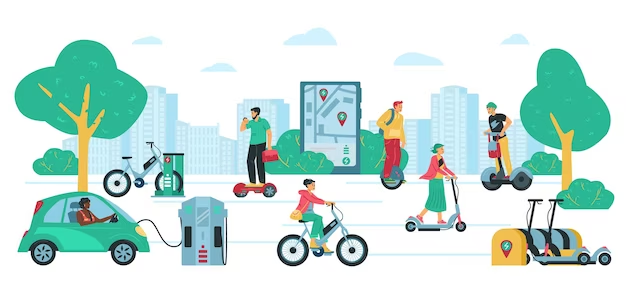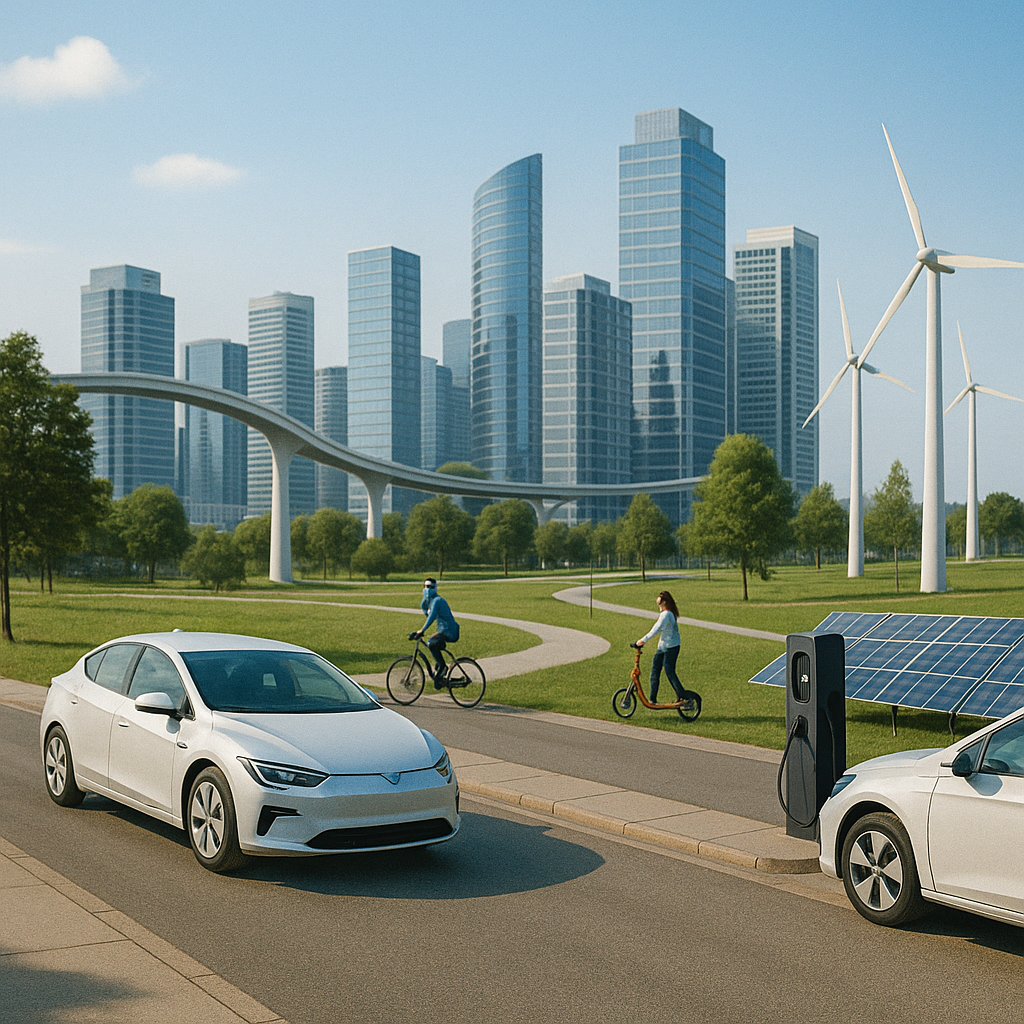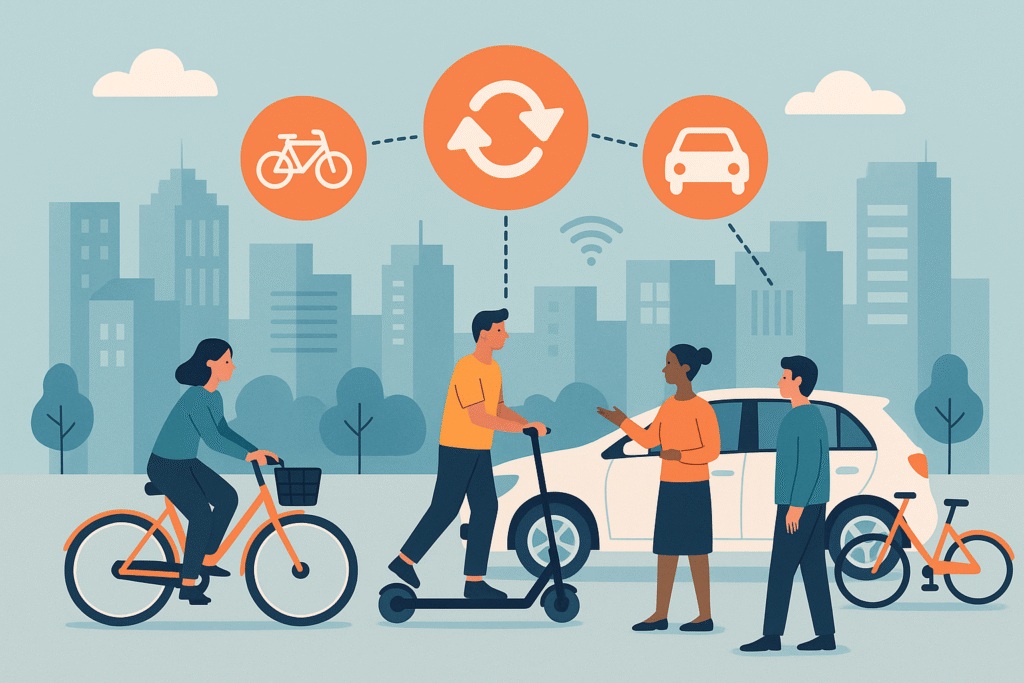The future of Mobility is here!
Imagine a city where getting around is seamless, affordable, and environmentally friendly. A place where owning a personal vehicle is no longer a necessity, but just one of many options available to move from point A to point B. This is the future that shared mobility is shaping—a future where car-sharing, bike-sharing, ride-hailing, and micro-mobility solutions are redefining urban transportation.
More and more people are embracing shared mobility as a smarter alternative to traditional car ownership, and it’s not hard to see why. It’s cheaper, greener, and encourages a more connected, engaged community. But what exactly makes shared mobility such a game-changer? Let’s take a closer look at three key ways it’s improving everyday life.
Saving Money & Reducing the Need for Private Cars
 Owning a car can feel like having a second mortgage. Between fuel, insurance, maintenance, and parking costs, the expenses add up fast. Yet, for many city dwellers, a personal vehicle spends more time parked than actually being driven. That’s where shared mobility comes in, offering flexible and cost-effective alternatives that let you pay only for what you use—without the financial burden of ownership.
Owning a car can feel like having a second mortgage. Between fuel, insurance, maintenance, and parking costs, the expenses add up fast. Yet, for many city dwellers, a personal vehicle spends more time parked than actually being driven. That’s where shared mobility comes in, offering flexible and cost-effective alternatives that let you pay only for what you use—without the financial burden of ownership.
Car-sharing services like Zipcar, Share Now, and Getaround give people access to a vehicle when they need it, whether for a quick grocery run or a weekend getaway. Ride-hailing platforms like Uber and Lyft provide on-demand transportation without the hassle of parking or maintenance. And for those looking for an even more budget-friendly option, bike-sharing and scooter-sharing services make short trips easier and more affordable than ever.
By reducing the need for private vehicles, shared mobility not only saves individuals money but also helps cities become less car-dependent, leading to less traffic, fewer parking headaches, and more urban space for people rather than cars.
Cutting Traffic and Pollution for a Greener Future
 There’s no denying that cars are a major contributor to both traffic congestion and air pollution. When too many people rely on private vehicles, roads become clogged, commutes get longer, and emissions skyrocket. Shared mobility tackles this issue head-on by encouraging more efficient use of transportation resources.
There’s no denying that cars are a major contributor to both traffic congestion and air pollution. When too many people rely on private vehicles, roads become clogged, commutes get longer, and emissions skyrocket. Shared mobility tackles this issue head-on by encouraging more efficient use of transportation resources.
Car-sharing and ride-pooling services maximize the use of each vehicle, meaning fewer cars are needed to move the same number of people. Meanwhile, bike-sharing and scooter-sharing options promote zero-emission transport, making them an excellent alternative for short trips that would otherwise be taken by car.
Many shared mobility providers are also investing in electric vehicles (EVs), further reducing their environmental footprint. Cities that embrace shared mobility see significant benefits: less congestion, cleaner air, and a more sustainable urban environment.
Creating More Connected and Inclusive Communities
 Shared mobility isn’t just about efficiency—it’s also about building stronger, more inclusive communities. Traditional transportation systems often leave gaps, especially in areas where public transit is limited. Shared mobility helps bridge those gaps by offering accessible, flexible, and affordable options for people who might not own a car or live near a subway or bus stop.
Shared mobility isn’t just about efficiency—it’s also about building stronger, more inclusive communities. Traditional transportation systems often leave gaps, especially in areas where public transit is limited. Shared mobility helps bridge those gaps by offering accessible, flexible, and affordable options for people who might not own a car or live near a subway or bus stop.
Carpooling and ride-sharing services bring people together, whether they’re commuting to work or sharing a ride to an event. Bike-sharing and scooters help connect neighborhoods, making it easier to explore different parts of a city. And in many cases, shared mobility improves access to jobs, education, and services for lower-income individuals who may not have other reliable transportation options.
By making urban mobility more inclusive, shared transportation solutions help create cities that work for everyone—not just car owners.
The Future of Shared Mobility: A Smarter Way to Move
As cities grow and evolve, shared mobility will play an increasingly vital role in shaping how we move, interact, and experience urban life. By reducing transportation costs, cutting emissions, and fostering a greater sense of community, these solutions are making daily life more convenient, sustainable, and connected.
The shift away from private car ownership isn’t just a trend—it’s a necessary step toward a smarter, cleaner, and more efficient future. Whether you’re hopping on a shared bike, carpooling with coworkers, or taking an electric scooter to your next meeting, every ride contributes to a better urban experience for everyone.





